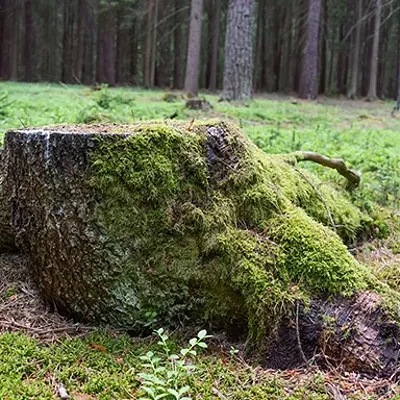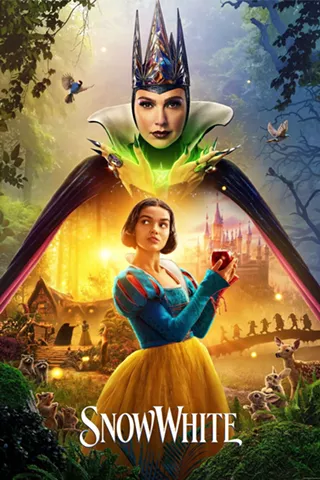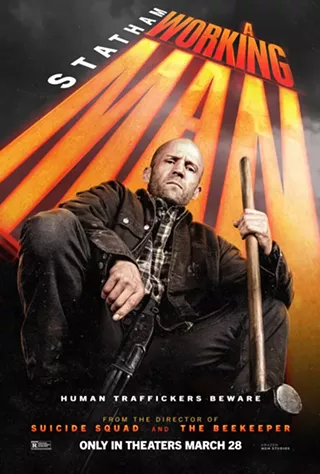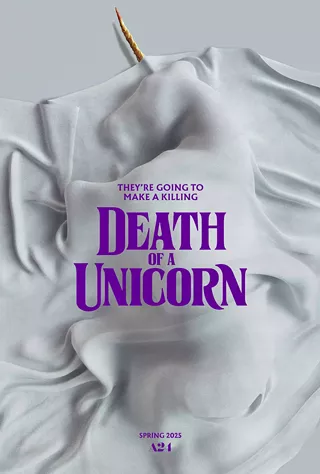Timothy was indeed a troubled man. After a youth of drunken excess and failure, he left the world of people behind and spent his final 13 summers living with bears and foxes. But Timothy was not your traditional survivalist mountain man. Instead, he was sort of like Emo Philips with wilderness skills and an ego the size of God's left testicle.
Grizzly Man is an odd collaboration between Treadwell, who filmed more than 100 hours of footage during his summers in the Aleutian wilderness, and Werner Herzog, the genius filmmaker behind such classics as Fitzcarraldo and Aguirre: The Wrath of God. Those are both films about men who struggle against nature, and Herzog, for his part, sees the natural world as a man's enemy. He notes that he differs from Timothy Treadwell in that Treadwell thinks of the natural world as a place of warmth, family and friendship, whereas Herzog thinks that the dominant principle of nature is unending strife and chaos.
But then, Herzog is German, and in a big way. Treadwell, on the other hand, is quintessentially American. Treadwell likes nothing better than to break rules and cast himself as the lone hero of his own story, a champion of the grizzly bear fighting against (mostly imaginary) poachers and human encroachment. Herzog, in commenting on Treadwell's desire to observe, talk to and even touch the grizzlies, notes that Treadwell is breaking "a very reasonable park rule." But Herzog is German: To him, rules must be followed. In fact, he's so dedicated to following rules that he once ate his shoe because he had offhandedly said he would (seriously: See the film Werner Herzog Eats His Shoe for the full story). Treadwell, American through and through, chafes at rules. Unlike Herzog, he didn't see civilization as the highest expression of spirit. Rather, he found the community of people stifling, and he couldn't live in it, so he invented, in a great and delusional work of art, a new self that took as best friends a fox, some bears and loneliness.
To make this new Timothy out of the old, he had to leave not just humanity, but big chunks of reality behind. He also made himself, in his own narrative, a great American hero. "If there is a God," he says, "God would be very pleased with me."
His fantastic self-image contrasted strongly with how others saw him. Timothy comes across as a big child, tremendously naïve and with a slippery grasp on the part of reality that didn't include him as a superhero-superstar. One of his detractors claims that the bears let him live among them for so long because "they thought he was mentally retarded or something."
Herzog is torn between these two views in his presentation of Treadwell's story. He notes that Treadwell's cinematic art exceeds that of most Hollywood directors because of its immediacy and indeterminacy. Yet Herzog fails to see that Treadwell's life was his art. He rather tends toward the view of Treadwell as the idiot who just happened to capture great images.
But what Treadwell was doing was much more complicated than that. Finding himself alienated from a world that had effectively eliminated wildness, he decided to alienate himself from that world. As his ex-girlfriend put it, he wasn't so much struggling against those who would hurt his animal friends as he was "struggling against civilization itself."
This is something that Herzog doesn't have any affinity for, but he's a talented enough filmmaker that he brings it forward in his editing and framing of Treadwell's videotapes. Where Treadwell thought the bears were his friends, Herzog sees in the faces of the grizzlies "only indifference and hunger." Yet it's hard to deny that Treadwell did make a closer contact with these animals than virtually any person ever had.
And what's more remarkable is that Treadwell truly did befriend wild foxes. They would sit near him and allow him to pet them and play with him. Herzog wisely leaves this footage unremarked upon, since there's nothing in his old world sensibility that could account for it.
What Herzog does remark upon repeatedly, and what makes the whole story poignantly ironic is that Treadwell was eventually eaten by a bear (I'm not giving anything away here; this is mentioned in the first few minutes of the film). On the one hand, this seems to confirm for Herzog his vision of nature as strife. On the other, Treadwell was not eaten by one of the bears he had befriended, but rather by a bear from a group he did not even know existed, a desperate, hungry, inland bear that behaved differently from the coastal bears that Treadwell had lived with for so long. Treadwell's strange end is the constant return point for Herzog's meditation, which makes sense, since it appeals both to his general philosophy of nature, and it provides a narrative thrust for the film.
But there's something far more interesting happening here. In the cult film Office Space, the lead character says of his life working in a cubicle, "Every day is the worst day of my life." Treadwell, in contrast, would stay with a friend each summer before going to the woods, and he would say to this friend, "This is the best year of my life." And so, once he had given up the common world and retreated into his own dangerous, heroic and self-invented life, every day became the best day of his life. The price of that was being eaten by a bear. For 13 years worth of such intensity, it seems worth it.













